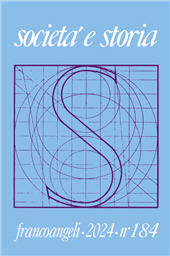I vescovi inquisitori del Regno di Napoli e l'Inquisizione romana
268-299 p.
Il vescovo-ÂÂinquisitore è il principale autore della corrispondenza che dalle diocesi meridionali è indirizzata verso la Congregazione della Santa Inquisizione romana, anche se al supremo tribunale si rivolgerà un insieme più ampio di attori sociali, ecclesiastici e secolari. La fonte di riferimento dello studio che qui si presenta è il carteggio conservato presso l'archivio del Dicastero della Dottrina della Fede, relativo al periodo compreso tra gli anni cinquanta del cinquecento ed i primi tre decenni del seicento. L'obiettivo è quello di contribuire a fare luce sul sistema dei tribunali di fede dispersi nel territorio del Regno di Napoli, a partire dalla metà del XVI secolo, durante la fase più acuta della battaglia anti-ÂÂereticale ed in quella successiva di consolidamento del ruolo egemone assunto dal Santo Ufficio all'interno della Chiesa post-ÂÂtridentina.
Il caso napoletano non appare sottrarsi ad un processo che coinvolgerà l'intera Penisola, pur mantenendo la sua peculiarità proprio nella centralità che in esso manterrà la rete dei tribunali diocesani ordinari. [Testo dell'editore].
The objective of this article is to provide insights into the inquisitorial system administered by episcopal courts, commencing with an examination of the correspondences exchanged between the bishoprics existing within the Kingdom of Naples and the central headquarters of the Roman Inquisition. The correspondences, housed in the Archive of the Dicastery for the Doctrine of the Faith, predominantly originate from bishops and their vicars, although ordinary ecclesiastics and local laity also address the cardinals of the Congregation. At the nucleus of the "episcopal model" lies the figure of the bishopinquisitor, frequently complemented by inquisitors dispatched from Rome.
This study, concerning the eight decades between roughly 1550 d 1630, delves into the primary challenges encountered in the inquisitorial activities conducted in the periphery of the Kingdom of Naples, as well as into the dynamics and conflicts emerging in the administration of justice concerning matters of faith. Central to the analysis are the transformations manifested during the transition from the initial operations of the Roman Inquisition to the establishment of the subsequent post-ÂÂTridentine epoch. Throughout this period, the Neapolitan process seems to follow the general pattern of the Peninsula, although maintainting the peculiar role played by the bishops-ÂÂinquisitors. [Publisher's Text].
Fa parte di
Società e storia : 184, 2, 2024-
Articoli dello stesso fascicolo (disponibili singolarmente)
-
Informazioni
Codice DOI: 10.3280/SS2024-184002
ISSN: 1972-5515
PAROLE CHIAVE
- Regno di Napoli, Inquisizione Romana, diocesi, vescovo, post-ÂÂtridentino
- Kingdom of Naples, Roman Inquisition, bischopric, bishop, post Tridentine epoch


